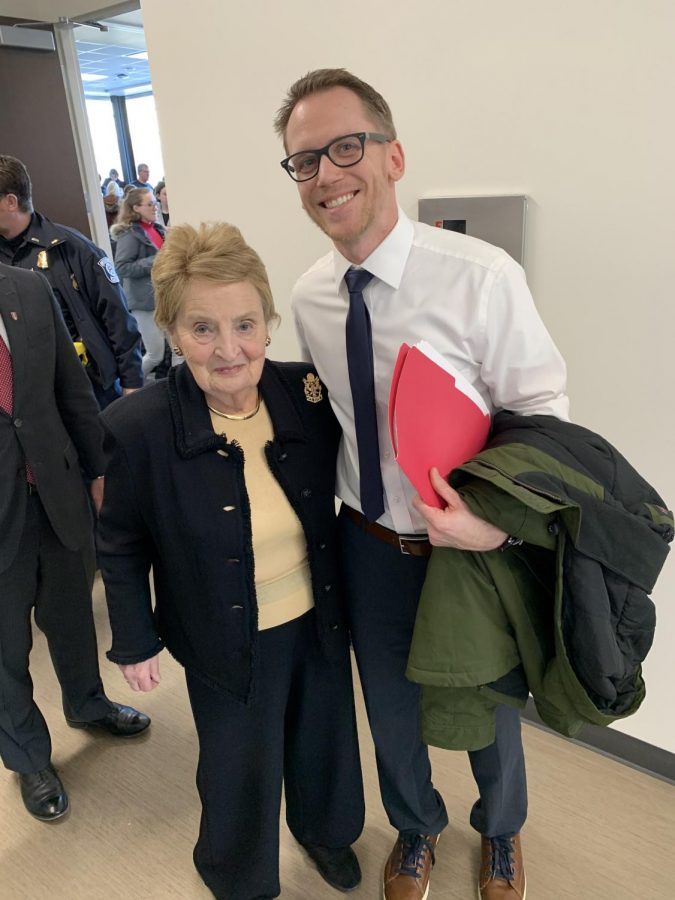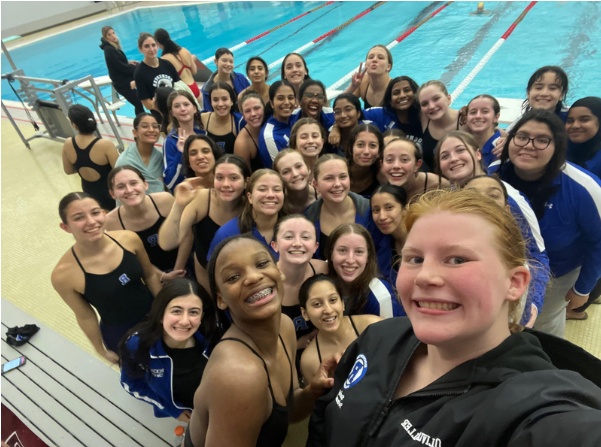A visit from Madeleine Albright, Elissa Slotkin and some socks.
February 25, 2020
The Oakland Center banquet rooms were full of all sorts of people from both sides of the line, and in addition, some saucy matching socks.
February 20, 2020, former U.S. Secretary of State Madeleine Albright, and U.S. Congresswoman Elissa Slotkin spoke to an audience of the young, old, and in between about the matters of national security, the values of mentor-ship, and the importance of national service.
The event was broken into two parts: (1) A private session with Oakland University students from a variety of majors,
and the Rochester Community District schools, and (2) a conversation open to the community. The difference between the two is that the first section gave students the opportunity to fire questions to Dr. Albright and Congresswoman Slotkin, whereas the second section was open to the public and was a structured conversation led by Beth Talbert, a special instructor in Oakland’s Department of Communication, Journalism and Public Relations.
Rochester High School senior, Meghan Jones, wore matching socks with Dr. Albright. She had seen her wear the socks before and had bought the same pair in hopes that Dr. Albright would be wearing them the day of the event, she was.
Although it is not known what Congresswoman Slotkin knew about the sock matching ordeal, she did admire the outfits of Dr. Albright that were considerably “on point.” Congresswoman Slotkin noted Dr. Albright and her ability to curate these “on point” outfits; To wear articles of clothing that represent the school colors of the universities they speak to. For instance, a day p
rior, the two women spoke to Michigan State University where Dr. Albright wore a green dress and blazer.
“Especially for the ladies in the audience, she was wearing green pantyhose,” Congresswoman Elissa Slotkin said in appraisal. “Ladies you know that’s something you can’t just get at the local CVS. The woman is on point with her outfits. She is on point”
Jones, who was one of the many students to address questions to Dr. Albright and Slotkin, has been passionate and hopeful to attend Wellesley College, a private women’s liberal arts college in Wellesley, Massachusetts. Dr. Albright is an alumni and has a fellowship in her name, The Albright Institute that was designed to inspire a new generation of global leade
rs.
“I wanted to start with a little Ice breaker so I commented on us having matching socks,” senior Meghan Jones said. “I moved into my question, how we […] have a similarity to where she went to college and where I plan and hope to go to college. She gave me a lot of information and really talked me up to that college and I really would love to go and then she asked for my name,” she said overwhelmingly, “… oh my God… oh my God.”
There are many honorable titles that Madeleine Albright has cinched under belt; The fi
rst female United States Secretary of State (1997 to 2001 under President Bill Clinton), American politician, diplomat, prolific author (e.g., “Fascism: A Warning (2018)), professor, etc. Dr. Albright was born just before World War 2 in Smíchov, Prague, Czechia, 1937. Albright, along with her family, immigrated to the United States from Czechoslovakia. Prior to immigration, her father, Jeff Kobel, served as a Czech Slovakia diplomat. Kobel and his family were able to escape to England and was with the government in exile in London. Albright recalls spending the first part of her life in an airaid – a cellar – during the Blitz. After the war, the Kobel family moved back to Czechoslovakia where Jeff Kobel was pronounced as Ambassador to Yugoslavia. From
there, Madeleine Kobel did schooling in Switzerland until the communists took over in Czechoslovakia and when immigration to the United States took place.
“Everything about my life is affected by having been a refugee twice,” Dr. Albright said. “I remember my father used to say […] ‘when we were in England people were very kind to us, but what they would say is, ‘we’re so sorry your country has been taken over by such a terrible dictator you are welcome here, what can we do to help you, and when are you going home. Now, when we came to the United States, people said ‘we’re so sorry your country has been taken over by a terrible system you are welcome here, what can we do to help you, and when will you become a citizen. He said that is what made America different from any other place in the world and I continue to believe that.”
Current Congresswoman Elissa Slotkin, of Michigan’s 8th Congressional District, born in 19
76 in New York City and grew up on a farm in Holly, Michigan. After the 9/11 attacks and during her last year of graduate school at Columbia University in New York City, Congresswoman Slotkin devoted her career to national service. She went on to be recruited by the Central Intelligence Agency (CIA) to be a Middle East analyst to protect the United States from national security threats. In 2011, she took senior position in the Pentagon, and in 2017, served as Acting Assistant Secretary of Defense for International Security Affairs.
“Public service and national service is the greatest love letter that you can write to your country that exists,” Congresswoman Slotkin said. “It could be military service where you’re willing to risk your life, or civilian service which could be anything from the intelligence community to the foreign service being a diplomat. Talk to as many people as you possibly can. Sit down, ask them for coffee and pick their brain.”
In recent years, the flux of women in politics has been on the rise. According to a current Pew Research survey, “59% of adults say there are too few women in high political offices. Women are far more likely than men to say that’s the case; so are Democrats and Democratic-leaning independents when compared with Republicans and GOP leaners.” The event at Oakland University touched on gendered conversation in politics where women were frowned upon from the start.
“I was always the only woman in the room and I think that it was very hard,” Dr. Albright said. “A thing that I learned […] you want to say something in a meeting and then feel like its something stupid so you don’t say it, and then some man says it and thinks its brilliant. Then you’re mad at yourself for not having spoken.”
Women entering male dominant fields were said to be very competitive where women would be cut-
throat to other women due to the treacherous climb to the top. Both Dr. Albright and Congresswoman Slotkin, being prominent female politicians, stuck to their morals of women supporting women.
“One of my experiences is that I’ve been helped by a tremendous number of men who also believe in bringing women up in the world and that shouldn’t be forgotten in any of our conversations,” Congresswoman Slotkin said. “I was at the Pentagon where I would be leading a meeting of three and four star generals and I would get there early because I’m leading the meeting. All of the staff aids of the three and four star generals were there early making sure that the book was open and to the right page, and I’d walk in and they would see this young female and look up at me and just say ‘oh take any of the seats in the back,’ and I’d say ‘no, I’m actually running this meeting, this is my meeting, you’re in my meeting.”
Throughout both of their careers they had been surrounded predominantly by men, however, they both shared in similarity that many of their mentors were men. Dr. Albright and Congresswoman Slotkin briefly touched upon their admiration and newfound friendship with one another.
“Think through what different generations can teach each other,” Dr. Albright said. “In my books, in my most recent one, I have quoted -there’s not a book or speech that’s ever written that doesn’t quote Robert Frost – that I’ve used is: ‘The
older I get, the younger are my teachers.’” she said endearingly. “You won’t agree with everything you hear from other people, but it’s worth absorbing and trying to figure out whether it fits into your life or not.”
With a predominantly younger audience in attendance, both women passionately urged the importance of making connections with others and getting involved.
“You have to find your people who you can rely on and trust and share experiences with,” Congresswoman Slotkin said. “You can’t do it alone, and I feel that strongly as a new member of congress. In the United States, fortune favors the bold.”
The Democratic and Republican parties will hold primary elections in Michigan on March 10, 2020, while the presidential election will be held on November 3.
“Democracy is not a spectator sport,” Dr. Albright said. “People in countries where they aren’t able to vote come out in the rain and are taking more of a risk but they’re out there really voting. If you don’t, then you don’t have a right to complain.”







